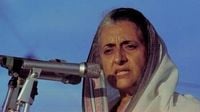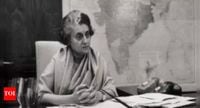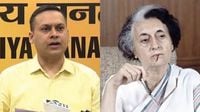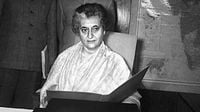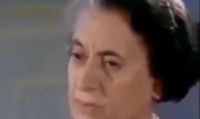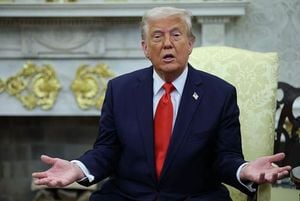NEW DELHI: The Bharatiya Janata Party (BJP) made headlines on Monday, April 21, 2025, by resurfacing a decades-old video of former Prime Minister Indira Gandhi questioning judicial overreach, amid a growing controversy over comments made by party MP Nishikant Dubey regarding the Supreme Court and Chief Justice Sanjiv Khanna. The video, shared by BJP IT Cell head Amit Malviya on social media platform X, features Gandhi challenging the competence of Justice J.C. Shah, who led the Shah Commission, which investigated the excesses of the Emergency era.
In the video clip, Gandhi can be heard questioning, "How does Mr. Shah know what is happening in the political world? What are the forces at work which want to destroy a developing economy? Is a judge competent to decide that? Then why have democracy? Why have elections? Why have political people in power?" The remarks reflect her concerns about the judiciary's role in political matters, a topic that resonates with current debates in India's political landscape.
The Shah Commission was established in 1977 by the Janata Party government to investigate allegations of abuse of power during Gandhi's rule, specifically focusing on the restrictions placed on civil liberties during the 21-month Emergency period. This resurfacing of Gandhi's remarks comes at a time when Dubey has faced backlash for his recent criticisms of the Supreme Court, suggesting that if the apex court continues to operate like a legislative body, Parliament should be shut down.
Dubey's criticism intensified earlier this week when he stated on X, "Kanoon yadi Supreme Court hi banayega to Sansad Bhavan bund kar dena chahiye," which translates to, "If the Supreme Court is going to make the law, then Parliament should be shut down." His comments have drawn ire from opposition parties, prompting the BJP to distance itself from his remarks.
In subsequent media interactions, Dubey escalated his attacks, accusing the Supreme Court of inciting religious wars and crossing constitutional boundaries. He expressed his discontent with recent directives from the Supreme Court, questioning how the judiciary could dictate terms to the appointing authority, referring to the President’s role in appointing the Chief Justice of India. He stated, "How can you give direction to the appointing authority? You want to take this country towards anarchy?"
Dubey also revisited the Supreme Court's decriminalization of homosexuality under Article 377, asserting that it contradicted the beliefs of major religions. He claimed, "There are only two sexes in this world, male or female. Hindu, Muslim, Buddhist, Jain or Sikh — all believe homosexuality is a crime," indicating that he felt the Supreme Court had overturned a long-standing societal norm without proper parliamentary discussion.
The BJP's decision to share the video of Gandhi appears to be a strategic move to counter the criticism directed at Dubey and to draw parallels between historical and current concerns regarding judicial overreach. By invoking Gandhi's words, the BJP aims to remind the public of her own challenges with the judiciary, suggesting that the issues raised by Dubey are not new.
In response to Dubey's comments, opposition leaders have voiced their concerns about the implications of questioning the judiciary. Congress leader Salman Khurshid expressed disappointment, stating, "It is a matter of great sadness if an MP questions the Supreme Court or any court. In our legal system, the final word is not of the government, it is of the Supreme Court. If someone does not understand this, then it is a matter of great sadness."
Another Congress leader, Jairam Ramesh, accused Dubey and the BJP of attempting to undermine the Supreme Court's authority. He remarked, "They are trying to weaken the Supreme Court. Constitutional functionaries, ministers, and BJP MPs are speaking against the Supreme Court as the Supreme Court is saying one thing when a law is made, you should not go against the basic structure of the constitution and if the law is against the constitution, we will not accept it."
Despite the backlash, the BJP has distanced itself from Dubey's remarks, emphasizing that they reflect his personal views and do not represent the party's stance. Party president J.P. Nadda affirmed the BJP's respect for the judiciary as an essential component of democracy, stating, "The party neither agrees nor does it ever support such statements."
This unfolding political drama highlights the ongoing tensions between the judiciary and the legislature in India, as well as the delicate balance of power that defines the country's democratic framework. As the BJP navigates this controversy, the resurfacing of Indira Gandhi's comments serves as a reminder of the historical complexities surrounding judicial authority in India.
As the debate continues, it remains to be seen how these discussions will shape the future interactions between the government and the judiciary and whether they will lead to any substantive changes in the relationship between these two vital branches of the Indian state.
